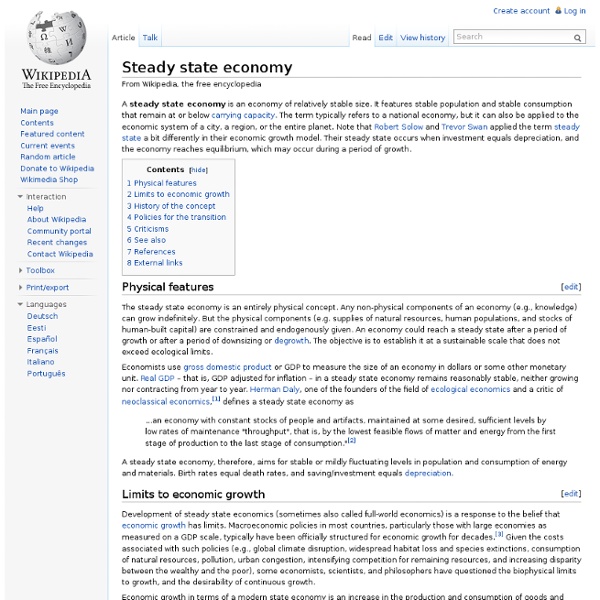Steady state economy

Sustainable development
Sustainable development is an organizing principle for human life on a finite planet. It posits a desirable future state for human societies in which living conditions and resource-use meet human needs without undermining the sustainability of natural systems and the environment, so that future generations may also have their needs met. Sustainable development ties together concern for the carrying capacity of natural systems with the social and economic challenges faced by humanity. As early as the 1970s, 'sustainability' was employed to describe an economy "in equilibrium with basic ecological support systems The term sustainable development rose to significance after it was used by the Brundtland Commission in its 1987 report Our Common Future. The United Nations Millennium Declaration identified principles and treaties on sustainable development, including economic development, social development and environmental protection. Definition[edit] Sustainability[edit] According to M.
Transition Culture
Can Decreix | decreixementacampadabcn
(català, castellano) Can Decreix is a place to demonstrate and reflect around the topic of degrowth. In case you are nor familiar with the term: Degrowth is a word with many co-meanings. Started by activist scientists from Research & Degrowth (www.degrowth.org), Can Decreix is a centre for transformation (of fruits, vegetables, societies), for research, for testing frugal technologies, arts and permaculture. Cerbere is a land of cactus, sea-side cliffs and rocky beaches, a cross-road for languages (French, Spanish and Catalan) and travelers (hosting a border train station between France and Spain). Can Decreix tries to be an open space, which is connected with its surroundings. The terrain has vineyards and olive trees, situated in the typical for Languedoc-Roussillon terrace shape construction. Can Decreix is also a quiet place for to thinking and writing. Some more informations and Photografs: here. Me gusta: Me gusta Cargando...
REconomy
Should socialists support degrowth?
by Don Fitz The question is not should we advocate reducing production within capitalist society but rather: How do we best relate to those struggles that are already occurring? Activists across the globe are challenging economic expansion which threatens the survival of humanity. Climate change is justifiably the focus of concern in the early 21st century. Yet corporate politicians shriek blindly that the only solution to economic crisis is increasing production. Reducing production would supposedly worsen the lives of working people.The degrowth movement began with bourgeois liberals.Since degrowth cannot occur within capitalism, discussing it should wait until “after the revolution.”The concept of producing less is too abstract to build a movement around.An anti-growth movement would easily be co-opted. Each of these deserves attention. 1. Most economic writers, even socialist ones, still seem to believe that there is a strong connection between production and consumption. 2. 3. 4. 5.
Related:
Related:



